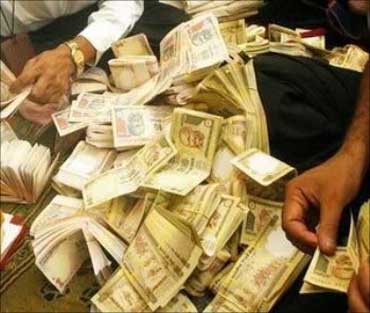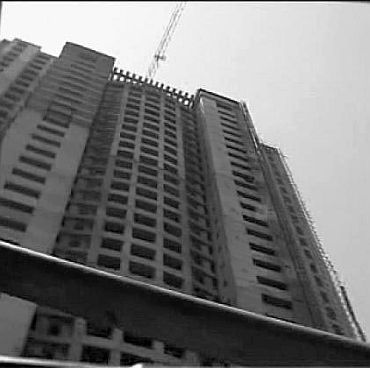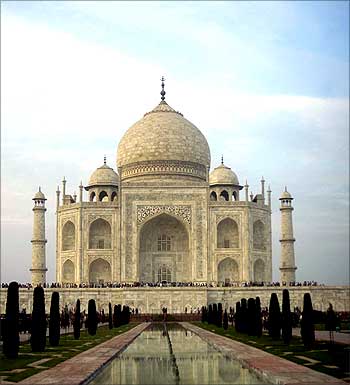Shubhashis Gangopadhyay
The veil over the 2G spectrum scam seems to be slowly lifting. As it reveals its ugly face, the country becomes more and more involved in speculating on the name of the next character that will take centre stage in this sordid drama.
We are also being treated to some excellent side-shows involving land scams in Maharashtra and the mining lease scams in Karnataka. All of this has come to light after the corruption episodes that hogged newspaper coverage during, and after, the Commonwealth Games.
Everybody loves a juicy story and we are lapping them up. However, if history is anything to go by, next year same time all of this will be forgotten and we will be patting ourselves on the back as we register a 9 per cent growth rate in GDP.
Some of the villains of today will continue in public life while others will be quietly making use of the monies they have stolen. And new corruption dramas will be enacted with a completely new set of actors.
. . .
Corruption booms in India as we depend on 'fixers'
Photographs: Reuters
No country has been able to completely get rid of corruption. What is remarkable in India is how widespread and systematic it is.
It is difficult to think of any one sphere of our lives where we can say that we will not face any corrupt activity. The question to ask is why corruption is so rampant here.
Let us begin with the telecom scam. Every country sells spectrum. The objective is, of course, to raise revenue subject to developing the communication infrastructure in ways that improve businesses and modern lifestyles.
There are several instances where countries have done this extremely successfully. There are other instances where errors have been made; most of them corrected never to be repeated again.
. . .
Corruption booms in India as we depend on 'fixers'
Photographs: Reuters
But, in India, be it government land, government spectrum, or government contracts, we never seem to come up with a process that prevents corruption. And, the reason is a simple one -- we do not believe in professionalism; instead, we depend on 'fixers' to get the job done.
Take for example the 2G scam. To begin with, the minister was not exactly a natural choice for this important ministry. The main fixer was not somebody who can in any way be described as a public or social policy strategist, or even someone who could be remotely described as a technologist of some repute.
Many of the companies that obtained licences at throwaway prices had no proven expertise in this field and they promptly sold a part (or all) of their holdings at obscene premiums to other players even before any market was developed by them.
Recall the exemplary success of the initial spectrum auction held in the United Kingdom that every nation wanted to emulate. Well, what is worth pointing out is that the person who led the UK auction, in its design and implementation, was not a fixer, was not a civil servant and certainly not a minister.
He was a reputed professor in game theory and economics, who went back to his academic career after the successful auction.
. . .
Corruption booms in India as we depend on 'fixers'
Photographs: Reuters
Take the issue of land. Both in acquisition and distribution, all decisions are taken by politicians and their relevant ministries. The expertise on, say, urban planning or on land auctions comes from politicians themselves or, from civil servants.
This is not to say that they should not be involved, but clearly they should demonstrate expertise on these specific issues before being asked to take decisions on them. Instead, lands are acquired, they are parcelled out among the loyal and faithful and then grandiose development plans are worked out.
So, those who got cheap allocations become rich overnight because of their proximity to decision makers. A professional approach would be to announce the plan first and then parcel out lands to the highest bidders.
I have a nagging feeling that it is not that our leaders do not know this. Indeed, they know that this will be a smart way to distribute acquired land for it will be transparent and will maximise the revenue to the state.
. . .
Corruption booms in India as we depend on 'fixers'
Photographs: Reuters
Since the final ownership is now decided through a competitive bidding process, a transparent formula for sharing the proceeds with the original owners can be stated upfront so that incidents like Singur and Adarsh can be avoided.
But, of course, we will not do it for our smart decision makers want a return on their smart decisions! And, they can get away with it because we do not demand any professional expertise from our decision makers.
If India has to develop into a knowledge-based economy, if India has to modernise, if India has to urbanise, if India has to build infrastructure, we have to become more professional-oriented.
Remember, our economy reformed in the nineties under a finance minister extremely well-trained in economics leading a team of other extremely well-trained economists in major official positions.
. . .
Corruption booms in India as we depend on 'fixers'
Photographs: Reuters
The reforms of the nineties were not orchestrated by fixers and that has put us on the growth path we are now experiencing. Professionals get their reputation from a job well done, not from the amount of money they have made, or allowed others to make, by networking in the corridors of power.
India will not be a leader among developing countries if people become experts by sitting on committees; they should be sitting on committees because they are experts.
Public policy decisions should be undertaken after they have been thrashed out in the public space by professionals. They cannot be left to be drawn up in closed-door meetings of civil servants and politicians.
Otherwise, fixers will continue to have a field-day and India will continue to be at the top of the list of corrupt countries.
The author is research director, India Development Foundation.








article